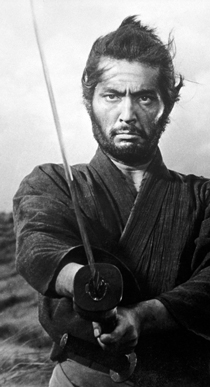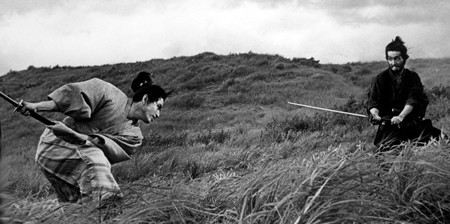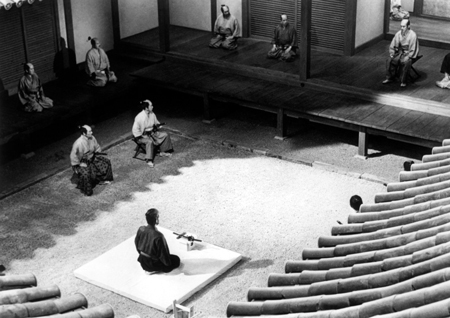
 |
|
|
|
The excellence of Masaki Kobayashi's Harakiri is immediately evident. Youthful star Tatsuya Nakadai plays a swordsman of a complexity and depth not encountered in many Samurai films. The initially straightforward story transforms into a devastating critique of the feudal system and the Samurai ethos. Director Masaki Kobayashi (Kwaidan) makes a good case against that code of honor -- and by extension the modern military codes based on it. Honored at the Cannes film festival, Harakiri is considered one of the best Japanese films ever made. 
The clever screenplay undercuts glamorous notions of Samurai lore. Penniless and starving, the Ronin Hanshiro Tsugumo (Tatsuya Nadakai) presents himself at the gates of the Iwa clan. He asks for permission to commit seppuku -- ritual suicide -- in their courtyard. Although he seems sincere the Iwa retainers are suspicious, as many penniless Ronin are approaching clans under the same pretext, when what they actually desire is a menial job or charity. The clan leader tells Tsugumo the story of Motome Chijiwa (Akira Ishihama), who had come not long before. Chijiwa had acted erratically but once his request was made the Iwa retainers compelled him to go through with the suicide. They also forced him to use his own dull bamboo knife, making the ritual twice as difficult. Tsugumo insists that his knife is not bamboo and he will not shirk, and all the Iwa retainers gather for the ritual. Tsugumo asks for one of three particular Iwa swordsmen to be his aiding executioner, but none can attend, offering excuses of illness. The Iwa leader demands that Tsugumo proceed anyway, but the wily Ronin has his own surprises to reveal. Generic Samurai films come in a number of stock themes, but director Kobayashi chooses instead to use the genre to criticize authoritarian hypocrisy. His Samurai hero has lost everything by no fault of his own. Tsugumo's clan leader was deposed over a political misstep, throwing 1200 vassals into limbo. Sworn to serve their master to the death, the many Ronin Samurai turned out into the streets have limited ways of making a living. Hanshiro Tsugumo holds onto the honor of his caste, refusing to let his daughter become a concubine and declining work not worthy of his rank. The story of Harakiri could easily be told on a stage, yet the film is in no way stage-bound. The present action takes place in the course of one afternoon, with several stories told in flashback form. Each flashback is a major narrative surprise, subverting what we've seen before while adding new levels of complication. The devious Iwa clan is moved by Tsugumo's sincerity. Some members suspect that his presence is a ruse, that he may have an agenda beyond his request for a venue to kill himself. Both conclusions turn out to be 100% true. 
Run-of-the-mill Samurai fare expects us to accept swordfighters that have near-superhuman skills, and to be resolutely steadfast and ruthless in their beliefs. The Samurai hero's stoicism and noble worship of death is frequently contrasted with corrupt bureaucrats, craven bandits or scheming turncoats. Hanshiro Tsugumo at first appears to be just this kind of impenetrable icon, insisting that he wants to die and challenging his Samurai peers to do little more than hear him out before he does himself in. Will he or won't he? Tsugumo's flashback narrative reveals him to be an ordinary man betrayed by his noble values. Desperate to save the life of his adored grandson, it never occurs to him to sell his valuable swords to pay for a doctor. Tsugumo's son-in-law appears to have skipped out on the family when he's most needed, until his horrible self-sacrifice is revealed. Tsugumo's mission at the Iwa compound is a suicide gesture that becomes a protest against the self-important Samurai who dwell within the Iwa compound. Kobayashi's film is fluid and animated, expertly directed to raise viewer involvement to the maximum. It has several excellent action scenes, including one grossly difficult act of seppuku. We can almost feel the sensation of trying to gut one's self with a butter knife. The action is realistically bloody. One classic duel on a windswept hill features star Tetsuro Tamba of the Bond film You Only Live Twice. 
Tatsuya Nakadai is a solid actor capable of projecting both rigid authority and strong depths of emotion; his best scenes involve his unrestrained affection for his daughter and grandson. That emotional bond makes us all the more concerned for Tsugumo's fate. We want very badly for the ragged Samurai to succeed in his mysterious mission. The film's cynical ending compares the hypocrisy of the Iwa clan with the corrupt corporate leaders in Akira Kurosawa's The Bad Sleep Well. The urge toward a cover-up of misdeeds and crimes also invites comparison with the conclusion of John Ford's Western Fort Apache. Cavalry officer John Wayne officially whitewashes the bad policies of his predecessor in the interest of maintaining the honor of the corps, and the audience is meant to approve. Harakiri takes a more jaundiced view of official lies in the name of so-called honor. Criterion's Blu-ray of Harakiri takes this beautiful picture up several notches in clarity. The excellent audio showcases Toru Takemitsu's spare score, highlighting the raw sounds of ancient instruments that would become the backbone of his horror omnibus Kwaidan. Donald Richie provides an introduction for the feature that carries too many spoilers; it should by no means be seen first. An original trailer is present as well. Disc producer Curtis Tsui is generous with the extras, all carried over from a 2005 DVD release. In addition to a poster gallery, the menus offer interviews with actor Tatsuya Nadakai and writer Shinobu Hashimoto. The Directors Guild of Japan provides a 1993 interview with Kobayashi excerpted from a longer show; director Masahiro Shinoda hosts. A thick pamphlet insert has an essay by scholar Joan Mellen, accompanied by her revealing 1972 interview with the sharp-minded and outspoken Kobayashi.
On a scale of Excellent, Good, Fair, and Poor,
Harakiri Blu-ray rates:
Reviews on the Savant main site have additional credits information and are often updated and annotated with reader input and graphics. Also, don't forget the 2011 Savant Wish List. T'was Ever Thus.
Review Staff | About DVD Talk | Newsletter Subscribe | Join DVD Talk Forum |
| ||||||||||||||||||